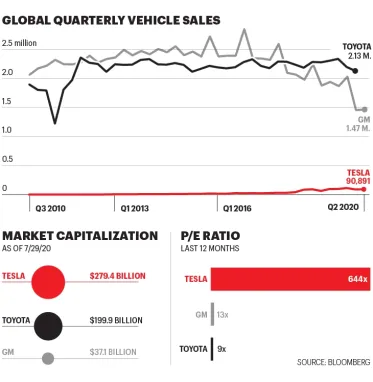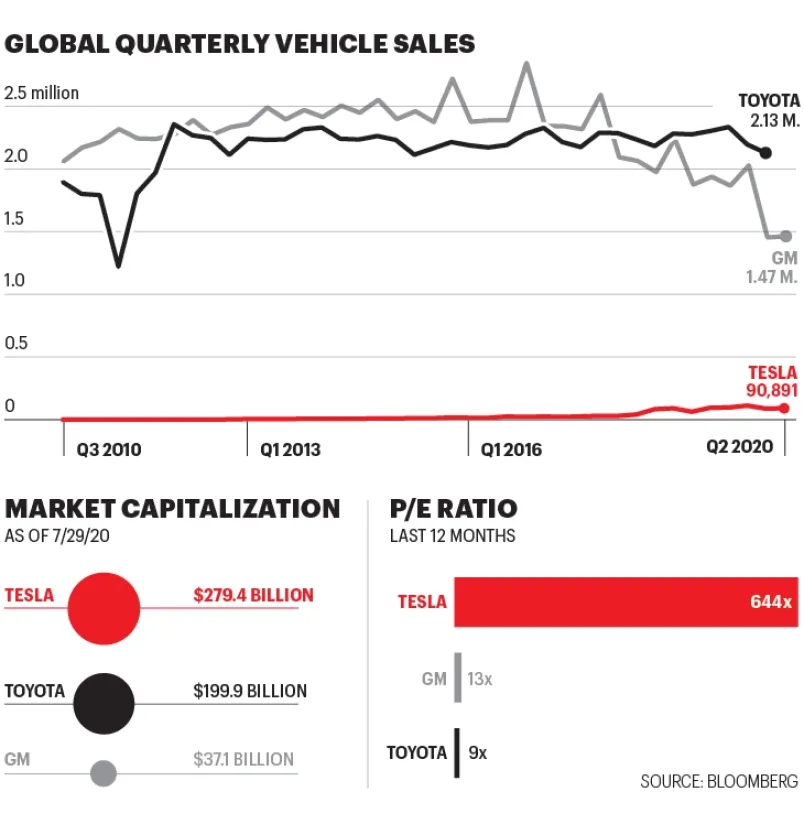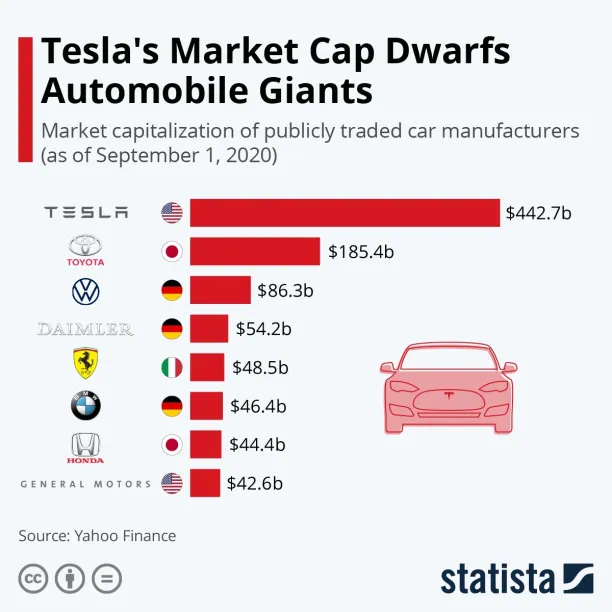Automotive Digital Transformation in '24: Trends & Use Cases


Technology-driven trends, new customer demands, the internet of things (IoT), and new advances in artificial intelligence support digital transformation (DX) in the automotive industry. This transformation involves product design process, manufacturing, maintenance, operations, and sales & marketing.
The competition in the automotive industry has changed in the last 20 years. Tesla, founded in 2003, became the most valuable car manufacturer since June 2020. Its investments in R&D, focus on electric vehicles and self-driving vehicles put Tesla forward in the industry. Compared to its earnings, Tesla was valued ±60x more than car manufacturing giants like GM as you can see in the image above.
What is digital transformation in automotive sector?
Like all businesses, automotive companies also want to digitize their businesses (e.g. in terms of data, connectivity, and cybersecurity) to gain numerous benefits such as productivity and observability. Numerous new technologies like process mining and deep learning enable this digitization. These technologies include deep learning algorithms, process mining, task mining and robotic process automation (RPA).
Why is digital transformation important in automotive?
Competition in the industry for manufacturers and service providers is tough and companies need to adapt to rapidly changing customer demands. Like in other industries, digital transformation is an unavoidable requirement to:
- Meet customer demands and improve customer experience
- Strengthen position in the marketplace
- Get ahead in the competition
This is especially critical for established manufacturing giants like Daimler, VW, Fiat etc. given that newcomers like Tesla have been valued at significantly higher valuations despite having limited commercial impact. As a result of the premium that the market places on Tesla, it is the most valuable car manufacturer with a $882 billion market cap in March 2022. Below, you can see how Tesla’s market cap was greater than the total market cap of the next six car manufacturers as of September 2020:

What are the benefits of digital transformation in automotive?
Digital transformation has obtained momentum in the automotive industry last 20 years with last advances in AI, IoT, and data analytics domain. Digital transformation provides important benefits for businesses:
- Launching new digital enabled services or businesses
- Design of customer-centric products
- Optimization of supply chains
- Increasing productivity (i.e. decreasing operational costs)
- Improvement in quality management
What are digital transformation use cases in automotive?
Product Design
Designing digital enabled services & products
Digital transformation in consumers’ lives are pushing automotive companies to change their product design processes and started to design automobiles with new features and services, following consumer requests and new trends:
- Autonomous driving/self-driving technology
- Alternative fuels / compliance with environmental regulations (e.g. electric vehicles, hybrid vehicles)
- Connected vehicles: integration of other software and hardware for better customer experience. For example intelligent components that can identify need for their maintenance and provide notifications in advance
- Vehicular communication systems
- Consumer expectations about higher energy efficiency and maintenance costs
- New habits and services such as ride-sharing and car-sharing
Designing with ML
New technologies also enable companies to use machine learning in design and leverage both historical data from vehicles as well as simulations to improve the design process.
Manufacturing
Digital transformation enables companies to construct smart plants. Capgemini Research claims that automotive manufacturing companies will transform 24% of their plants into smart factories by 2022 and 49% of companies already made >$250 million investments for this transformation.
Increased use of manufacturing robots
Companies in the automotive industry have been using robots on assembly lines to increase their productivity since the 70s but now this is becoming more common. For example, BMW Group uses material handling robots and smart transports which are developed by Nvidia. The robots can detect and move objects autonomously with data from IoT and neural networks algorithms.
Manufacturing optimization with ML
Factories use data from IoT and machine learning advanced algorithms to manage their production lines such as planning and revising schedules, plaining maintenance operations of factories, or detecting problematic parts.
Predictive Maintenance
Vehicle Maintenance/Service
Intelligent components like sensors gather data about vehicle performance and analyze it in the cloud to:
- Identify potential sources of failure in the future.
- Notifying drivers to prevent incidents
These advanced features may transform the automotive service sector and we may have a next-generation service including new services such as software upgrades.
Maintenance in manufacturing
Deep learning solutions are used to improve maintenance operations by processing production data from equipment and machines.
Supply Chain optimization
Real-time data from multiple sources is used to manage inventory and purchasing processes. Digitalization in supply chain operations allows companies to optimize their processes. So, they can respond to market changes more quickly. Low costs, supply chain transparency, minimizing defects can be advantages that digital transformation provides to companies. For example, Bosch can gather data from sensors from its plants and third-party logistics firms to have a complete view of its shipments.
Sales
Interactive showrooms
Customers want to make virtual tests before buying a car. Therefore, companies need to set up digital platforms with virtual reality capabilities. Audi has a virtual showroom in London and provides an interactive experience by virtual tests for customers such as hearing sound effects, opening doors, and looking inside.
Chatbots
Chatbots can help qualify users, answer their pressing questions and boost sales.
What are the key trends that enable DX in the automotive industry?
Environment: As environmental awareness gains importance and environmental policies are made on climate change, people want to use environmentally friendly cars. Automotive companies are trying to build more sustainable vehicles.
Connectivity: Companies in the industry have started to design and produce new cars with connectivity features. Drivers want to change their experience with their cars and expect their cars to:
- Connect to apps and social media (e.g. music apps)
- Have customized media content and navigation
- Provide digital assistance for driving
- Enable paying parking fees from vehicle’s dashboard
Autonomous Driving: Self-driving technology will be real and common in the near future. Data from cameras and sensors are analyzed by advanced algorithms and this allows people to have safe driving. However, data privacy and cyber security can be tough challenges in this area.
Besides Tesla, many companies are making investments in autonomous vehicles, such as Apple, Audi, Bosch, and Huawei. Autonomous cars are expected to have a 15% market share of passenger vehicles sold worldwide in 2030.
Other trends include:
- Increased process awareness via
- Digital Twins
- Process Mining
- Task Mining
- IoT has numerous applications but when used on the manufacturing shop floor, it increases awareness about the production process
- Improved analytics via automated machine learning
- Increased back office automation via Robotic Process Automation (RPA)
For example, Cobmax, a sales call center, implemented a RPA solution, which reduced back-office operations by 50%, sold 20,000 products each month, and produced client reports in 1 day vs 2-3 days. 1
What is the future of digital transformation in automotive?
The whole value chain of automotive companies may be digitalized in the future. As a result:
- Companies’ operations can have higher software/technology dependency with expansion of digital transformation applications.
- More partnerships can be seen between technology vendors and automotive companies.
- New consumer value definition and business models, data protection, feature upgrades and cybersecurity will continue to be important subjects which shape digital transformation in the automotive industry.
What are the challenges of digital transformation in automotive?
- Investment: Digital transformation investments require significant capital. Return on investment (ROI) of these digitalization projects can be uncertain for some investments.
- Impact analysis: It is not easy to see expected benefits of digital transformation on business performance and objectives in a short time. This can slow down new projects and investments in the automotive industry.
- Data privacy: Companies in the industry are collecting consumer, driver and vehicle data to improve features of vehicles and design new products and mobility services. Concerns about data security arise in the automotive industry like in other industries.
- Complexity: Digital transformation means changing business model and customer definition. It includes major changes and all operations can effect this transformation. Therefore, complexity of DX projects may be a challenge for companies. The transformation process should be managed meticulously, culture and talent change in the organization should also be prioritized.
Feel free to read our other articles about digital transformation:
- Digital Transformation
- Digital Transformation Frameworks
- Digital Transformation Consultants
- Reasons for digital transformation (DX) project failure
If you need help in digital transformation for your business, we can help you get started, let us know:
External Links
- 1. “Removing growth obstacles with robotic process automation.” IBM. 2020. Revisited May 9, 2023.

Cem has been the principal analyst at AIMultiple since 2017. AIMultiple informs hundreds of thousands of businesses (as per similarWeb) including 60% of Fortune 500 every month.
Cem's work has been cited by leading global publications including Business Insider, Forbes, Washington Post, global firms like Deloitte, HPE, NGOs like World Economic Forum and supranational organizations like European Commission. You can see more reputable companies and media that referenced AIMultiple.
Throughout his career, Cem served as a tech consultant, tech buyer and tech entrepreneur. He advised businesses on their enterprise software, automation, cloud, AI / ML and other technology related decisions at McKinsey & Company and Altman Solon for more than a decade. He also published a McKinsey report on digitalization.
He led technology strategy and procurement of a telco while reporting to the CEO. He has also led commercial growth of deep tech company Hypatos that reached a 7 digit annual recurring revenue and a 9 digit valuation from 0 within 2 years. Cem's work in Hypatos was covered by leading technology publications like TechCrunch and Business Insider.
Cem regularly speaks at international technology conferences. He graduated from Bogazici University as a computer engineer and holds an MBA from Columbia Business School.
To stay up-to-date on B2B tech & accelerate your enterprise:
Follow on

Comments
Your email address will not be published. All fields are required.